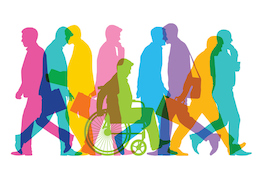Toolbox — For Training and Youth Work
All new tools in your inbox: Be the first to know about new tools for learning with our e-mail notifications.
Simulation Exercise, Video
Not Just Words
A workshop about the rights of people with disabilities with film components.
Aims of the tool
1) To illuminate the invisible questions and issues on disability topic;
2) To create films as an educational material;
3) To promote activism for equal society;
4) To think about ways on helping people with disabilities who suffer from the discrimination.
Description of the tool
The activity can be organized as a separate event or as a part of longer project. For the activity 5 to 10 minute video should be make by the organizers beforehand where people with disabilities are telling about the discrimination, hate crime and hate speech they've faced. It's important the film/video to be created locally to be more understandable for different communities.
1) The workshop begins with a documentary film/video of personal stories from people with disabilities prepared by the organizers.
2) After the video the facilitator suggests participants to discuss (around 20 minutes) the list of the essential questions, which can be modified or supplemented according to the needs of the groups and objectives of the meeting:
- Have you ever thought about the issue “what is to be a person with disabilities?”
- What kind of difficulties you might face?
- Where people with disabilities can find enough motivation and inspiration to have a decent life?
3) Simulation activity consists of 3 situations which will involve all the participants randomly divided into 2 equal parts (roles of people with and without disabilities). The facilitator explains following rules (5 minutes):
- the first part of the route is to be under the hate speech pressure that will be provided by the role-players. Participants cross the room where the role-players behave in a certain way (previously prepared). Timing depends on the number of participants (e.g. 10 or 15 min).
- In the second episode both parts of the participants will face with physical aggression (in a safe mode). Timing depends on the number of participants (e.g. 10 or 15 min).
In the third episode an actor demonstrating the authority (who is abuse their position) doesn’t allow the group with disabilities to move forward using fake rules and offensive phrases, e.g “People with disabilities are not allowed to walk here/Its not acceptable for you to be here, we are preparing for some occasions and you are not suitable for the whole picture.”) The actors cannot be seen before the dynamic episodes for it to be more realistic. Timing depends on the number of participants (e.g. 10 or 15 min)
4. The next part is the deroling (facilitator can chose the method) and debriefing where the facilitator lets the participants make their own conclusions. Asking “How do you feel now? Do you think we need to totally change our attitude to this issue?”. The debriefing should be finalized with the positive aspects and solutions: “How can we prevent these situations?” “How can we inspire people with disabilities and motivate them?” etc. (20 min)
5. The closing video of the workshop serves as motivational and inspiring element: https://youtu.be/m5kiQ_5oAfE (5min).
Additional comments: the facilitator should be aware about the participants' personal background and be sure that the activity will not recall an emotional trauma in any of participants. You can send out a form to the participants in advance to know if there are people who might have problems with the simulation part.
Disclaimer
SALTO cannot be held responsible for the inappropriate use of these training tools. Always adapt training tools to your aims, context, target group and to your own skills! These tools have been used in a variety of formats and situations. Please notify SALTO should you know about the origin of or copyright on this tool.
Tool overview

http://toolbox.salto-youth.net/2553
This tool is for
Youth workers above 21, People with disabilities
and addresses
Social Inclusion, Disability
It is recommended for use in:
Training and Networking
Materials needed:
Film, Projector, computer, walker, wheelchair, eye-closing clothes.
Duration:
2 hours (including a 10 min. coffee break)
Behind the tool
The tool was created by
Marie Iversen Bjørn, Alexandra Popova, Sona Arsenyan, Maria Costa
in the context of
"DocusSpeech Against Hate Speech" Long-term Project in Luxembourg and in Armenia
The tool has been experimented in
Norway, Forum on Disabilities 2019
The tool was published to the Toolbox by
Seg Kirakossian (on 26 September 2019)
and last modified
3 June 2019
Comments
No comments have been posted yet.
If you want to comment on this tool, you need to be signed in with your MySALTO account. Sign in now